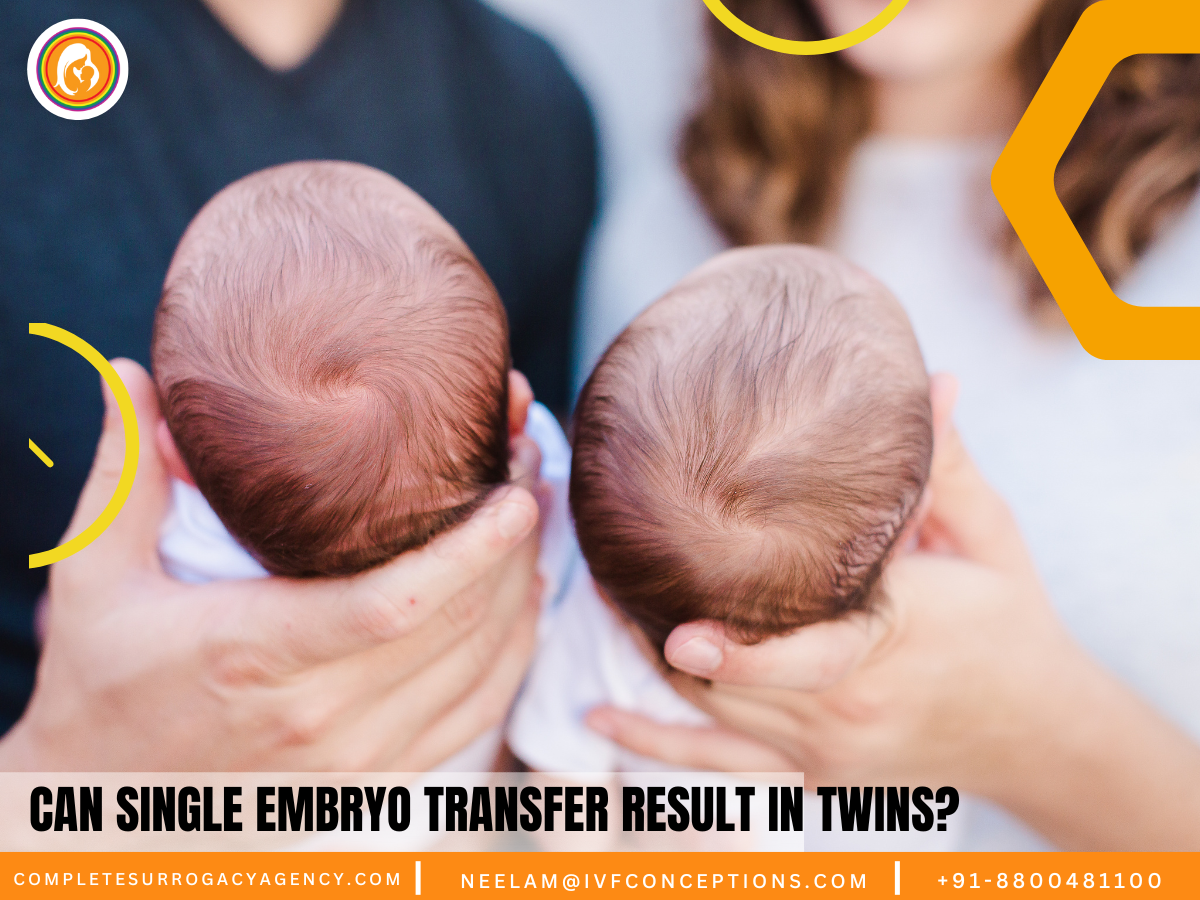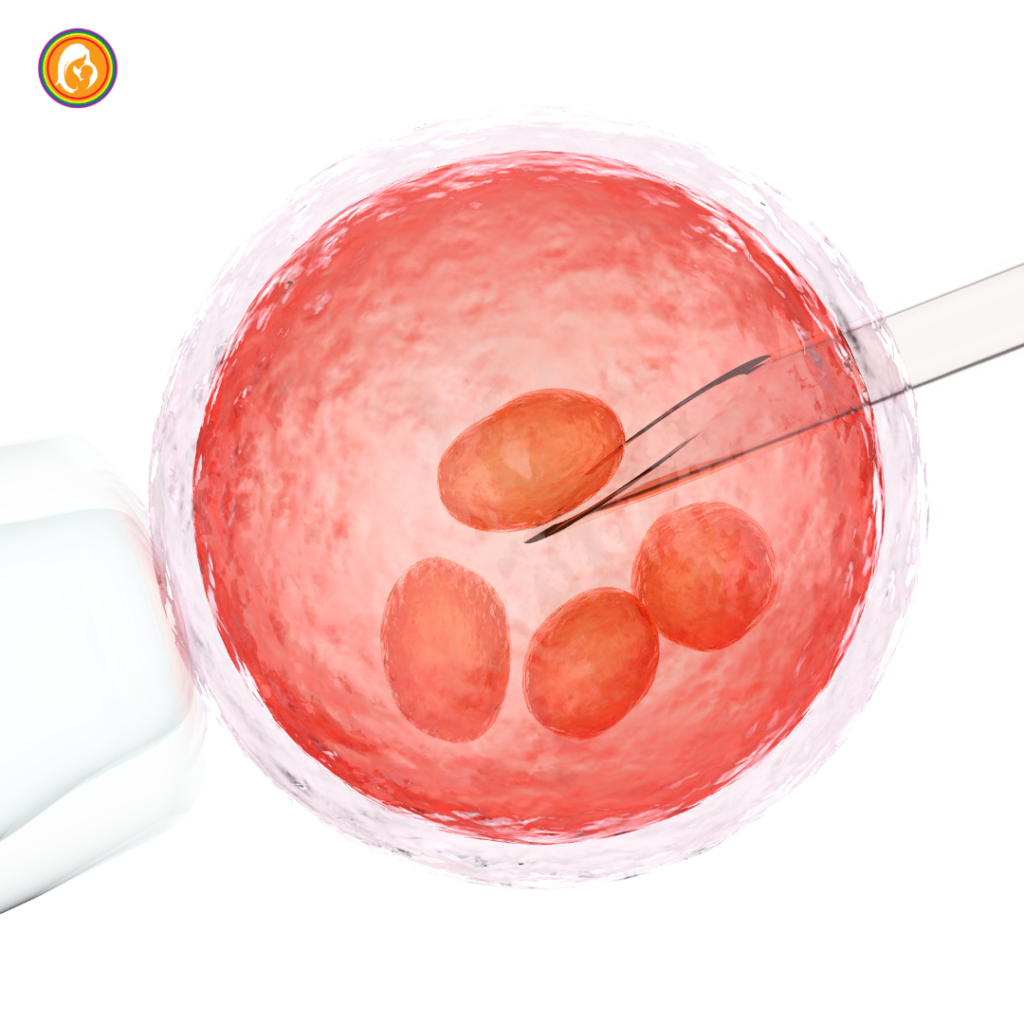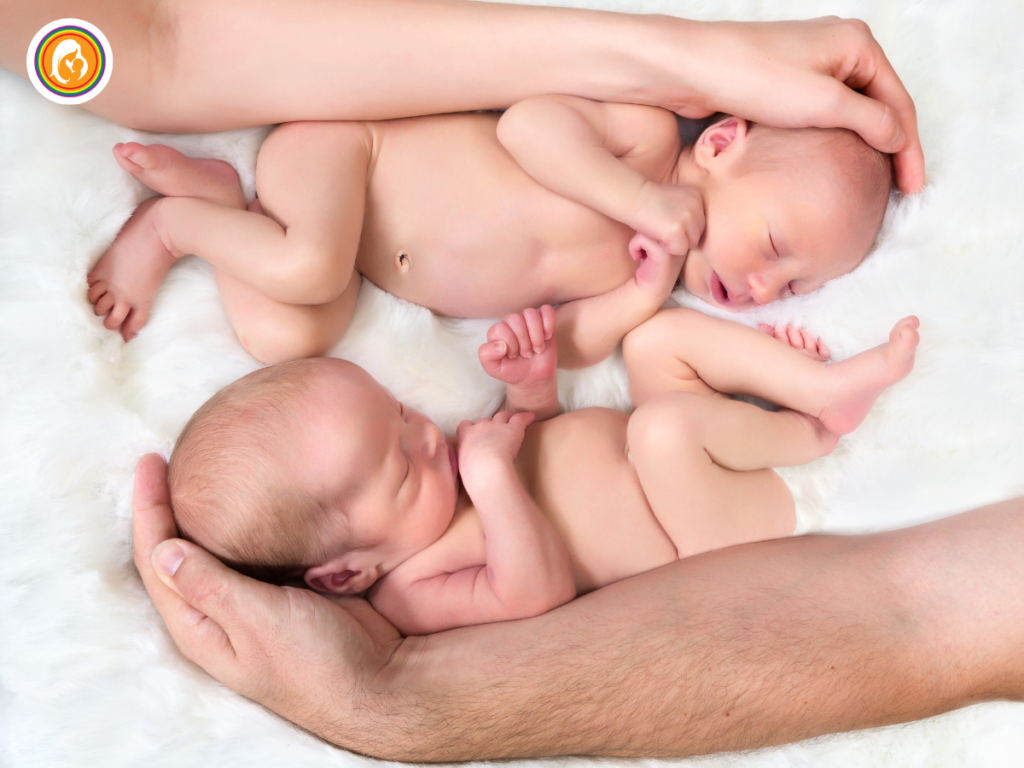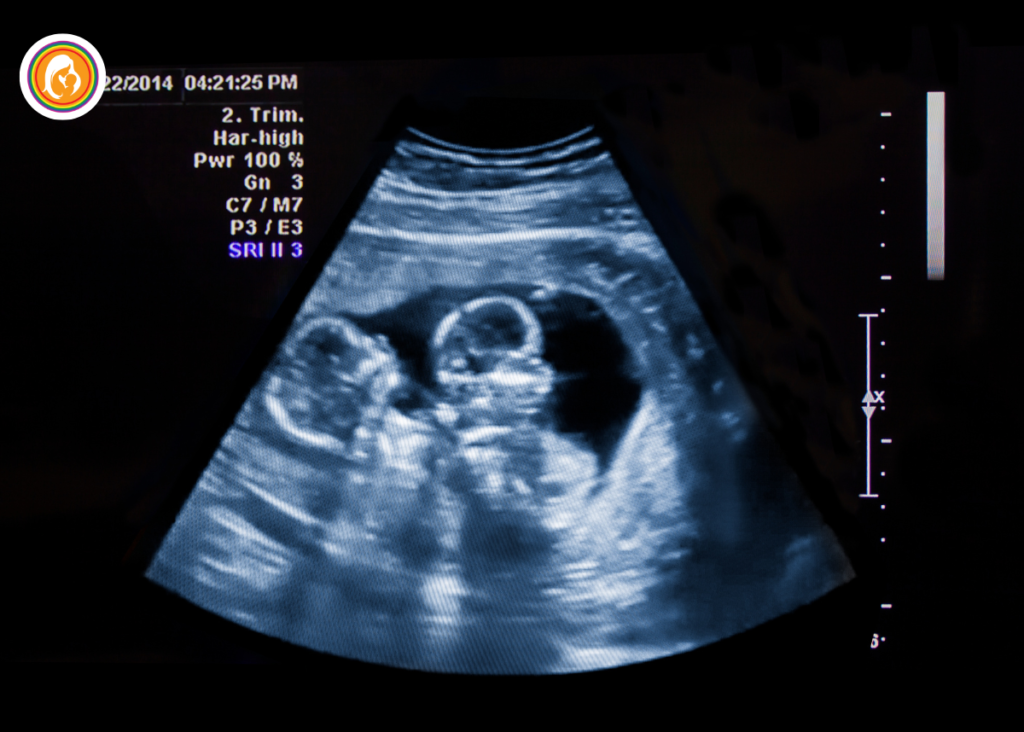Can Single Embryo Transfer Result in Twins?

Yes, a single embryo transfer (SET) can result in twins in rare cases. In the field of assisted reproductive technologies (ART), one common question is whether a single embryo transfer can lead to twin pregnancies. While SET is generally recommended to reduce the risks of multiple pregnancies, there are still occasional instances where the transferred embryo splits into two, leading to twins.
Can Single Embryo Transfer Result in Twins? It’s important to understand that although this outcome is uncommon, it can happen. Single embryo transfer success rates have improved significantly over the years, reducing the likelihood of multiple pregnancies.
- Book an online appointment: Get a free online consultation.
- Call\W:+91-8800481100 Email:neelam@ivfconceptions.com
However, factors influencing embryo splitting and ART procedures can still occasionally result in the rare occurrence of twins, even when only one embryo is implanted. It’s essential for prospective parents to discuss this possibility with their fertility specialists to ensure the best approach for their specific situation.
This comprehensive guide will cover the science behind IVF (In Vitro Fertilization), the criteria for SET, the chances of twins, and the factors influencing this occurrence.
More Resources to Read:
Surrogacy Guide for Surrogate Mothers
Understanding IVF Side Effects: What to Expect
How does the surrogacy process work
Understanding IVF and Embryo Transfer
In Vitro Fertilization (IVF) is a widely recognized fertility treatment that involves retrieving eggs from the ovaries and fertilizing them with sperm in a laboratory setting. The resulting embryos are then transferred into the uterus, where they may implant and lead to a successful pregnancy.

What is Single Embryo Transfer (SET)?
Single Embryo Transfer (SET) involves transferring one embryo into the uterus during an IVF cycle. This approach is commonly used to minimize the risk of multiple pregnancies while maintaining high success rates. However, there are rare cases where SET can still result in twins due to various factors.
Key Advantages of SET:
- Reduced Risk of Multiple Births: Lower chances of twins or triplets, which can be risky for both mother and babies.
- Lower Financial Burden: Less costly compared to multiple embryo transfers.
- Emotional Relief: Decreased stress and anxiety related to multiple pregnancies.
Factors That Can Affect the Chances of Twins with SET
Although rare, several factors can influence the likelihood of twins following a single embryo transfer. These include:
- Quality of the Embryo: High-quality embryos have a higher chance of implantation and division.
- Stage of the Embryo: Blastocyst-stage embryos (Day 5) are more likely to implant and possibly divide.
- Patient’s Age: Younger patients may have a higher chance of successful implantation.
- Natural Ovulation: Unretrieved oocytes during natural ovulation may lead to a second pregnancy.
Success Rates with Single Embryo Transfer
When considering SET, understanding the success rates and the potential for twin pregnancies is essential. Here’s what the data reveals:
Success Rates and Twin Pregnancies

Single Embryo Transfer (SET):
- Success Rate: 40-50%
- Live Birth Rate: 30-35%
- Twin Rate: 1.6%
Double Embryo Transfer (DET):
- Success Rate: 60-70%
- Live Birth Rate: 45-50%
- Twin Rate: 27.5%
Table 1: Success Rates of SET vs. DET
| Transfer Type | Success Rate | Live Birth Rate | Twin Rate |
| Single Embryo Transfer (SET) | 40-50% | 30-35% | 1.6% |
| Double Embryo Transfer (DET) | 60-70% | 45-50% | 27.5% |
The Evolution of Embryo Transfer Criteria
In the early days of IVF, multiple embryo transfers were common to increase pregnancy chances. However, this led to higher rates of multiple pregnancies, including twins and triplets, which posed significant risks. As medical knowledge advanced, the focus shifted towards achieving healthy singleton pregnancies, leading to the adoption of Elective Single Embryo Transfer (eSET).
Criteria for Elective Single Embryo Transfer (eSET)
The success of eSET largely depends on patient selection and counseling. The criteria include:
- Age: Ideal for patients under 35.
- First IVF Cycle: Higher success rates in the first attempt.
- Embryo Quality: Only high-quality embryos are considered.
- Ovum Donor Cycle: Often used in donor egg cycles.
- Embryo Stage: Preferably at the blastocyst stage (Day 5).
Table 2: Criteria for Elective Single Embryo Transfer (eSET)
| Criteria | Ideal Condition |
| Age | Under 35 |
| First IVF Cycle | Yes |
| Embryo Quality | High-Quality Embryos |
| Ovum Donor Cycle | Yes |
| Embryo Stage | Blastocyst (Day 5) |
Addressing Fears and Misconceptions
Many couples fear that eSET might reduce their chances of pregnancy. However, decades of research indicate that under favorable conditions, such as young age and high embryo quality, pregnancy rates between single and double embryo transfers are comparable.

Scientific Observations on Twins with eSET
Several studies have been conducted to assess the likelihood of twins with eSET. For example, a Japanese study analyzed 937,848 eSET pregnancies and found that the overall chance of twins was only 1.6%, with 1.36% being monozygotic (identical) twins and 0.3% dizygotic (fraternal) twins.
Table 3: Likelihood of Twins with eSET
| Type of Twin | Percentage of Occurrence |
| Monozygotic Twins (Identical) | 1.36% |
| Dizygotic Twins (Fraternal) | 0.3% |
| Total Twins with eSET | 1.6% |
Factors Leading to Twins in SET
- Dizygotic Twins: Can occur due to natural ovulation and coitus.
- Zygotic Splitting: A rare phenomenon where a single zygote splits into two embryos.
The Role of Patient Counseling
Given the rarity of twin pregnancies with eSET, patient counseling is crucial. Couples must be informed about the risks and benefits associated with single embryo transfer. For those concerned about multiple pregnancies, eSET offers a safer option without significantly compromising the chances of a successful pregnancy.
More Resources to Read:
Infertility Treatment and Surrogacy Process
9 Factors To Improve IVF Pregnancy Rate
International Surrogacy Options Worldwide
Surrogacy Guide for Surrogate Mothers
Final Thoughts
While single embryo transfer is a highly effective method for achieving healthy singleton pregnancies, the possibility of twins, though rare, still exists. As ongoing research continues to provide insights, couples undergoing IVF treatments can confidently choose eSET, knowing it minimizes the risks of multiple pregnancies while maintaining high success rates.
By staying informed, following medical guidelines, and making well-informed decisions, couples can embark on their parenthood journey with confidence and hope.
If you’d like to learn more about IVF, Egg Donation, or surrogacy services globally, check out the rest of our website at Complete Surrogacy Agency. We offer legally secure and affordable surrogacy consulting services for FREE.
Complete Surrogacy: Your Trusted Partner in International Surrogacy
At Complete Surrogacy, we have over 15 years of experience in international surrogacy, guiding 4,000+ intended parents worldwide. We provide safe, ethical, and affordable surrogacy solutions for single parents, LGBTQ+ couples, and heterosexual couples.
As members of EFS and ESHRE, we adhere to the highest ethical and professional standards. Our expert team is committed to providing accurate, compassionate, and transparent guidance, ensuring a legally secure and smooth journey to parenthood.
Let us help you build your family with trust, care, and integrity.
Get in touch for one FREE Surrogacy Consultancy!

FAQs About Twins with Single Embryo Transfer
What is the likelihood of having twins with a single embryo transfer?
The likelihood is around 1.6%, with most cases being identical twins.
Are there factors that increase the chances of twins with SET?
Factors such as the patient’s age, embryo quality, and natural ovulation can influence the chances.
How does age impact the likelihood of twins with SET?
Younger patients generally have a higher chance of successful pregnancies, but age also affects the risk of twins.
Can multiple pregnancies be risky?
Yes, multiple pregnancies, including twins, can pose risks like preterm labor and low birth weight.
What are the success rates of single embryo transfer?
Success rates are comparable to those of double embryo transfer in favorable conditions.

Author Bio: Neelam Chhagani is an International Surrogacy Expert with 15 years of experience in the fertility and surrogacy domain. As the founder of IVF Conceptions and Complete Surrogacy, she has guided over 4,000 intended parents worldwide on their surrogacy journey to parenthood. Recognized as a trusted authority, she specializes in holistic infertility solutions and third-party reproduction consulting.
Holding an MA in Counselling Psychology and a PGD in Mental Health, Neelam is a proud member of the European Fertility Society (EFS) and the European Society of Human Reproduction and Embryology (ESHRE). She is also a leading surrogacy blogger, providing valuable insights into ethical and practical surrogacy solutions.
Since 2010, committed to supporting ALL family types, Neelam has been passionate about helping intended parents grow their families with compassion, integrity, and a focus on secure and affordable surrogacy options Globally.
Learn more about Neelam:
https://www.ivfconceptions.com/neelam-chhagani-surrogacy-consultant/
https://www.linkedin.com/in/neelam-chhagani-92892229/















I was introduced to Neelam by a friend who worked with Neelam for surrogacy. Neelam is absolutely wonderful. I am a single male and the journey to fatherhood is not that easy. Neelam connected me to a program ideal for my circumstances. She was with me throughout the pregnancy providing advice and guidance along the way. I am so grateful I found her and am thrilled today that I have a beautiful daughter. I highly recommend Neelam to anyone who is on a journey to become a parent. Having a child has changed my world for the better. I wish others success with their own journey and recommend you connect with Neelam to find a path that is best for you.
SA (USA)